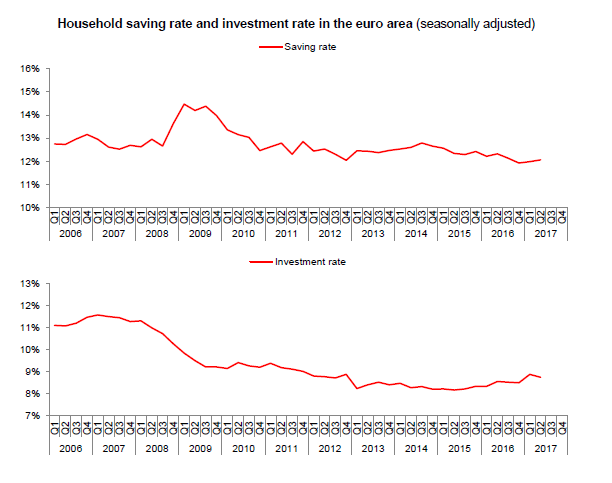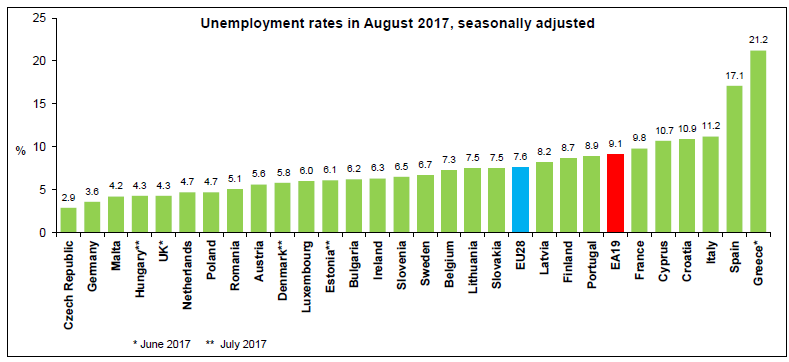Eurostat/Household saving rate nearly stable at 12.1% in the euro area/5 Οκτωβρίου, 2017 The household saving rate in the euro area was 12.1% in the second quarter of 2017, compared with 12.0% in the first quarter of 2017. The household investment rate in the euro area was 8.7% in the second quarter of 2017, compared with 8.9% in the previous quarter. Σχετικές Αναρτήσεις Eurostat/ Household saving rate up to 12.3% in …Read More
What has driven the votes for Germany’s right-wing Alternative für Deutschland?
Roth, Alexander, Wolff, Guntram B., (2017), “What has driven the votes for Germany’s right-wing Alternative für Deutschland?”, Bruegel, 5 Οκτωβρίου Last Sunday’s federal election in Germany gave unprecedented strength to the right wing party Alternative für Deutschland (AfD). The AfD is the third-largest party, with 12.6% of the votes and 94 of the 709 seats in the Bundestag (since the election, two members have left the AfD parliamentary group). Much …Read More
Euro area unemployment at 9.1% – EU28 at 7.6%
Eurostat/Euro area unemployment at 9.1%-EU28 at 7.6%/2 Οκτωβρίου 2017 The euro area (EA19) seasonally-adjusted unemployment rate was 9.1% in August 2017, stable compared to July 2017 and down from 9.9% in August 2016. This remains the lowest rate recorded in the euro area since February 2009. The EU28 unemployment rate was 7.6% in August 2017, down from 7.7% in July 2017 and from 8.5% in August 2016. This is the lowest rate recorded …Read More
Employment in Europe and the US: the EU’s remarkable strength
Darvas, Zsolt, Pichler, David, (2017), “Employment in Europe and the US: the EU’s remarkable strength”, Bruegel, 28 Σεπτεμβρίου The common narrative that the US labour market outperforms the EU is not as trustworthy as overall unemployment figures imply. There is a complex interaction between job creation, labour force participation and unemployment. Jobseekers leaving the labour market altogether was an important factor behind the reduction in US unemployment, while Europe’s job …Read More
Quantitative Easing and Long-Term Yields in Small Open Economies
Diez de los Rios, Antonio, Shamloo, Maral, (2017), “Quantitative Easing and Long-Term Yields in Small Open Economies”, IMF Working Paper No. 17/212, 29 Σεπτεμβρίου We compare the effectiveness of Federal Reserve’s asset purchase programs in lowering longterm yields with that of similar programs implemented by the Bank of England, the Swedish Riksbank, and the Swiss National Bank’s reserve expansion program. We decompose government bond yields into (i) an expectations component, …Read More
A Jamaican Germany is good for Europe
Wolff, Guntram B., (2017), “A Jamaican Germany is good for Europe”, 29 Σεπτεμβρίου After a surprising election result, Europe is closely watching German coalition negotiations. A so-called Jamaica coalition of conservatives, liberals and greens is the most likely outcome, but many fear this will be bad for the EU and the Eurozone. Not so, argues Guntram Wolff. In fact, a shift to Jamaica could be good news for Europe. Σχετικές …Read More
Study and Reports on the VAT Gap in the EU-28 Member States: 2017 Final Report
Center for Social and Economic Research (CASE), (2017), “Study and Reports on the VAT Gap in the EU-28 Member States: 2017 Final Report”, Institute for Advanced Studies, 18 Σεπτεμβρίου This analysis serves as the Final Report for the DG TAXUD Project 2015/CC/131, “Study and Reports on the VAT Gap in the EU-28 Member States”, which is a follow up to the reports published in 2013, 2014, 2015, and 2016. We …Read More
Yes, the German election has created a problem for euro area reform.
Zettelmeyer, Jeromin, (2017), “Yes, the German election has created a problem for euro area reform.”, Peterson Institute for International Economics, 27 Σεπτεμβρίου Αngela Merkel will carry on as German chancellor, but has emerged weakened from the September 24 German parliamentary election. Has this outcome undermined the prospect for deepening Europe’s economic and monetary union (EMU)? Compromises on euro area reform have clearly become more difficult, and the political opportunity created …Read More
A European perspective on overindebtedness
Veron, Nicolas, Zettelmeyer, Jeromin, (2017), “A European perspective on overindebtedness”, Bruegel, 28 Σεπτεμβρίου The sequence of crisis and policy responses after mid-2007 was a gradual recognition of the unsustainability of the euro-area policy framework. The bank-sovereign vicious circle was first observed in 2009 and became widely acknowledged in the course of 2011 and early 2012. The most impactful initiative has been the initiation of a banking union in mid-2012, but …Read More
From a vicious to a virtuous cycle? Turning Greece into an attractive investment destination: Opportunities and Challenges
Karamouzis, Nikolas, Monokroussos, Platon, Anastasatos, Tasos, (2017), “From a vicious to a virtuous cycle? Turning Greece into an attractive investment destination: Opportunities and Challenges”, Eurobank Research, Economy and Markets, Volume XI, Issue 3, Σεπτέμβριος Since the signing of the first bailout agreement with official creditors in May 2010, Greece has made remarkable progress in eliminating its earlier fiscal and current account deficits, restoring international price competitiveness and implementing significant reforms …Read More






